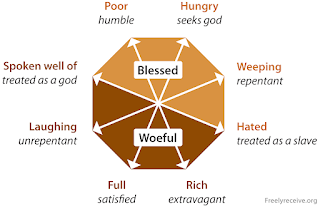_________________________________
This weekend, Jesus is not preaching his Beatitudes on a mountain (as he does in Matthew’s Gospel), he’s preaching his Beatitudes on a plain. On level ground.
But
that doesn’t mean that Jesus isn’t still talking about elevation in Luke’s
Gospel.
The Oxford dictionary defines the word elevation
this way:
The action or fact of elevating
(something).
Jesus is elevating something important for us this weekend
and wants us to take notice.
In the time of Jesus (and for many today), it was believed
that only the wealthy and prosperous were worthy of God’s abundant blessings.
This
is why the rich had no struggles. They were “blessed” by God who was taking
care of them and their many endeavors.
Conversely,
the poor and marginalized were cursed by God.
But Jesus comes along to turn that thinking on its head.
For years before Jesus, Hebrew scriptures pointed to the
poor and oppressed as those deserving special attention. The prophets spoke of
this often over the centuries before Jesus. But people didn’t listen. Are we
listening today?
As author of Jesus, A Pilgrimage, Jesuit Fr. James
Martin says, “But Jesus goes beyond that, elevating them in his reign and
offering them as models of discipleship. (The poor and oppressed) provide a
partial sketch of character traits, attitudes, and virtues befitting disciples.”
The Beatitudes are often referred to as “the Gospel within
the Gospel.”
Luke situates this Beatitudes on level ground, not on a
mountain. He has just come off a mountain after naming his twelve apostles.

In other words, his message is intended for everyone.
Yes, even
us.
No doubt many in the crowd were elated to hear they were
counted among the blessed.
He’s
basically promising the poor and oppressed that they, too, can share in the
reign of God. Not just the rich. This was revolutionary thinking at the time.
Is it still revolutionary thinking?
If we closely examine the Greek word used by Jesus for the
poor, we have a clearer picture of his message: ptochoi is the word used. It
means beggar.

How
many people hearing that might bristle at the thought that the homeless people
found in abundance here in Seattle are blessed?
But this is what Jesus is proclaiming.
In our society today (and the society in Jesus’ time), the
poor, the beggars were seen as “lazy” or “foolish” or even “losers.”
These are people set aside by society as human trash.
Marginalized for how they live and survive in a land of plenty.
These are the people Jesus is talking about today.
For our Sacred Encounters missionaries, “Blessed are you
when people hate you, and when they exclude you, revile you, and defame you on
account of the Son of Man.”

These are people worthy of our love and attention.
“The ones on the bottom are (now) on top. The ones who are
ignored are celebrated. The ones who are pushed aside are given a pride of
place… Blessed are they (indeed).”
As Pope Francis reminds us, “we can learn much from the
poor.”
Those
without wealth, power or status have a natural dependence on God for their
daily needs. This is who Jesus wants us to be like.

Our homeless friends were the first to point her out to us
and say, “She’s a target. She will be robbed. Can you do something to help
her?”
We put the woman up in a hotel and then worked to get her
into a woman’s shelter that allows animals based in Bellevue.
The kindness and generosity of our unhoused friends can be
overpowering at times.
I
cannot tell you how many times we hear the words “God bless you” every time
we’re out. Or see someone we’ve given a blanket to offer that same blanket to
another person when we run out of blankets.
These
experiences are good reminders of the Beatitudes lesson Jesus is speaking of
today.
Jesus is calling us all to be people of the Beatitudes.

Here’s an interesting fact for reflection: the word
“blessed” in Greek carries two meanings: “blessed” or “happy.”
Now, let’s change this weekend’s reading and I challenge
you to ponder this:
“Happy are you who are poor,
for
the kingdom of God is yours.
Happy
are you who are now hungry,
for
you will be satisfied.
Happy
are you who are now weeping,
for
you will laugh.
Happy
are you when people hate you,
and
when they exclude and insult you,
and
denounce your name as evil
on
account of the Son of Man.
Rejoice and leap for joy on that day!”
Maybe Jesus is
giving us the key to happiness in the Christian life: by embracing simplicity
and living the Beatitudes.
___________________________________
HOMILIA – VI Domingo
Ordinario Time – Elevación
Este fin de semana, Jesús no está predicando sus Bienaventuranzas
en una montaña (como lo hace en el Evangelio de Mateo), está predicando sus
Bienaventuranzas en una llanura.
Pero eso no significa que Jesús todavía no esté
hablando de elevación en el Evangelio de San Lucas.
El
diccionario Oxford define la palabra elevación de esta manera: La acción o
hecho de elevar (algo).
Jesús
está elevando algo importante este fin de semana y quiere que nos demos cuenta.
En
el tiempo de Jesús (y para muchos hoy), se creía que sólo los ricos y prósperos
eran dignos de las abundantes bendiciones de Dios.
Por el contrario, los pobres y marginados fueron
maldecidos por Dios.
Pero
Jesús viene a darle la vuelta a ese pensamiento.
Durante
los años antes de Jesús, las escrituras hebreas señalaron a los pobres y
oprimidos como aquellos que merecen una atención especial. Los profetas hablaron de esto a menudo a lo
largo de los siglos antes de Jesús. Pero la gente no escuchó. ¿Estamos
escuchando hoy?
Como
dice el autor de “Jesús, Una peregrinación”, el Padre jesuita Jaime Martin:
"Pero Jesús va más allá de eso, elevándolos en su reinado y ofreciéndolos
como modelos de discipulado. (Los pobres y oprimidos) proporcionan un bosquejo
parcial de los rasgos de carácter, actitudes y virtudes propias de los
discípulos".
Las
Bienaventuranzas a menudo se conocen como "el Evangelio dentro del
Evangelio".
San Lucas
sitúa estas Bienaventuranzas en un terreno nivelado y no en una montaña. Acaba
de salir de la montaña después de nombrar a sus doce apóstoles.
Lo primero que hace después de esto es
dirigirse a una "gran multitud" de personas con sus Bienaventuranzas.
En su mensaje hay un conjunto de instrucciones operativas para sus discípulos
(especialmente los Doce).
En
otras palabras, su mensaje está destinado a todos.
Sí, incluso nosotros.
Sin
duda, muchos en la multitud estaban eufóricos al escuchar que eran contados
entre los beatos.
Básicamente está prometiendo a los pobres y
oprimidos que ellos también pueden ser parte del reino de Dios. No solo los
ricos. Este era un pensamiento revolucionario en ese momento.
Si
examinamos de cerca la palabra griega utilizada por Jesús para los pobres,
tenemos una imagen más clara de su mensaje: ptochoi es la palabra
utilizada. Significa mendigo.
Imagínese
si proclamáramos: "Dichosos los mendigos".
¿Cuántas personas que escuchan eso podrían erizarse
al pensar que personas sin hogar que se encuentran en abundancia aquí en
Seattle son bendecidos?
Pero esto es lo que Jesús está proclamando.
En
nuestra sociedad actual (y en la sociedad en el tiempo de Jesús), los pobres,
los mendigos eran vistos como "perezosos" "tontos" o
incluso "perdedores".
Estas
son personas reservadas por la sociedad como basura humana. Marginados por cómo
viven y sobreviven en una tierra de abundancia.
Estas
son las personas de las que Jesús está hablando hoy.
Como
nos recuerda el Padre Martin, "Incrustado en las Bienaventuranzas está el
reconocimiento de que algunos discípulos serán considerados como personas que
no importan".
Estas
son personas dignas de nuestro amor y atención.
"Los
de abajo están (ahora) arriba. Los que son ignorados son celebrados. A los que
son dejados de lado se les da un lugar de honor ... Bienaventurados son ellos
(de hecho)".
Nos recuerda el Papa Francisco, "podemos
aprender mucho de los pobres".
Aquellos sin riqueza, poder de estatus tienen una
dependencia natural de Dios para sus necesidades diarias. Esto es lo que Jesús
quiere que seamos.
Recuerdo
un momento en que una nueva mujer sin hogar apareció por primera vez en las
calles de Everett. Acababa de bajar de un tren de fuera del estado con una
nueva bolsa de lona, un pequeño perro de terapia y una disposición dulce.
Nuestros
amigos sin hogar fueron los primeros en señalarla y decirnos: "Ella es un
objetivo. Le robarán. ¿Puedes hacer algo para ayudarla?"
Pusimos
a la mujer en un hotel y luego trabajamos para llevarla a un refugio para
mujeres que permite animales con base en Bellevue.
La amabilidad y generosidad de nuestros amigos sin
hogar puede ser abrumadora a veces. No puedo decirte cuántas veces escuchamos
"Que Dios te bendiga" cada vez que salimos. O ver a alguien a quien
le hemos dado una manta, ofrecer esa misma manta a otra persona cuando nos
quedemos sin mantas.
Estas experiencias son buenos recordatorios de las
Bienaventuranzas de las que Jesús está hablando hoy.
Jesús nos está llamando a todos a ser personas de
las Bienaventuranzas.
El Padre Martin dice: "Jesús está diciendo que
más que ayudar a los pobres y más que trabajar para combatir los sistemas que
los mantienen pobres, debemos llegar a ser como ellos, en su simplicidad,
generosidad y dependencia de Dios".
Aquí hay un hecho interesante para la reflexión: la
palabra "bendito" en griego tiene dos significados:
"bendito" o "feliz".
Ahora, cambiemos la lectura de este fin de semana y
los desafío a reflexionar sobre esto:
"Felices
son ustedes que son pobres,
porque el reino de Dios es suyo.
Felices son ustedes que ahora tienen hambre,
porque estarán
satisfechos.
Feliz son ustedes que ahora están llorando,
porque se reirán.
Feliz son cuando la gente los odia,
y cuando los excluyen e
insultan,
y los llaman malvados
a causa del Hijo del
Hombre.
¡Regocíjense y salten de alegría en ese día!"
Tal vez Jesús nos está dando la clave de la
felicidad en la vida cristiana: abrazar la sencillez y vivir las
Bienaventuranzas.










